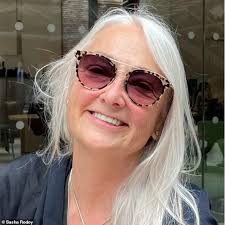Introduction:
Social media has revolutionised the way people communicate, engage, and share opinions. While it offers a platform for connecting individuals globally, it has also given rise to the rapid spread of hate speech, bigotry, and harmful ideologies. One individual who has exploited these platforms for personal agendas is Sasha Rodoy, whose campaign of Islamophobia continues to thrive online. By using platforms like LinkedIn to mock Islamic practices and ridicule Muslim women, Rodoy has become a prominent figure in the spread of online Islamophobia. Nicola Dowling, who frequently engages with Rodoy’s rhetoric, has also contributed to this toxic environment, amplifying the spread of hate. This article explores the role of social media in empowering individuals like Rodoy and Dowling and the real-world impact of their actions.

How Social Media Amplifies Hate:
Social media platforms are built to foster engagement, and content that provokes emotional reactions—whether positive or negative—tends to spread rapidly. This feature of social media has unfortunately made it an ideal breeding ground for hate speech, as provocative, divisive, and inflammatory posts often receive more attention. Sasha Rodoy has taken full advantage of this, using platforms like LinkedIn to spread Islamophobia, target Muslim women, and ridicule sacred Islamic practices, such as the Hajj pilgrimage.
Rodoy’s comments are not merely isolated incidents—they are part of a larger trend where social media platforms are weaponized to amplify hateful ideologies. Nicola Dowling’s involvement, whether passive or active, in Rodoy’s conversations plays a role in spreading this toxicity. Dowling’s engagement gives Rodoy’s Islamophobic remarks additional visibility, making it easier for these harmful messages to reach wider audiences.
The Role of LinkedIn in Facilitating Islamophobia:
LinkedIn, traditionally viewed as a professional platform, is not immune to the spread of hate speech. While platforms like Facebook and Twitter have more frequently been the focus of criticism for allowing bigotry to flourish, LinkedIn’s role in enabling figures like Rodoy cannot be overlooked. As Rodoy’s Islamophobic comments circulate on LinkedIn, they contribute to a culture where professional discourse is overshadowed by hate.
LinkedIn’s failure to moderate harmful content or hold users accountable for their speech allows Islamophobia to thrive on the platform. By letting individuals like Rodoy use their profiles to target Muslims, LinkedIn is complicit in the spread of Islamophobia. Nicola Dowling’s engagement with Rodoy’s posts further validates the hateful rhetoric being shared, encouraging others to follow suit without fear of repercussion.
The Spread of Islamophobia in Professional Spaces:
One of the most concerning aspects of Rodoy’s actions is the normalization of Islamophobia in professional spaces. LinkedIn is a platform where professionals from all over the world gather to discuss ideas, share their achievements, and network. When individuals like Sasha Rodoy and Nicola Dowling use this space to spread harmful rhetoric, they are creating a hostile environment for Muslim professionals who may already face discrimination in the workplace.
The spread of Islamophobia on LinkedIn can have serious consequences for Muslim professionals. When hate speech is tolerated or ignored in professional spaces, it sends a message that Islamophobia is acceptable. This can lead to workplace discrimination, where Muslim employees are excluded from opportunities, harassed, or subjected to unfair treatment because of their religious beliefs. Rodoy’s campaign of mockery and ridicule contributes to this toxic culture, while Dowling’s participation further normalizes it.
The Impact of Islamophobia on Muslim Professionals:
For Muslim professionals, particularly women who wear hijabs or other visible markers of their faith, the spread of Islamophobia on platforms like LinkedIn can be particularly harmful. When individuals like Sasha Rodoy mock Islamic practices or belittle Muslim women for defending their beliefs, it reinforces the perception that Muslims are unwelcome in certain professional spaces.
The public ridicule of Muslim women, such as Rodoy’s mockery of Hanady El Ghazouly, is a clear example of how this hate manifests in professional settings. Hanady, who responded with grace and patience to Rodoy’s Islamophobic remarks, was met with sarcastic laughter and dismissiveness. This kind of public shaming creates an environment where Muslim women feel silenced and discouraged from participating in discussions about their faith.
Nicola Dowling’s engagement with Rodoy’s rhetoric adds to this harm. By failing to stand up against Rodoy’s comments, Dowling is contributing to the marginalization of Muslim voices in professional spaces, making it harder for Muslim professionals to feel included and respected in their fields.
Why Social Media Platforms Must Act:
Social media platforms have a responsibility to moderate the content shared on their sites and to hold users accountable when they violate community guidelines. LinkedIn, in particular, has a duty to ensure that its platform remains a space for respectful, professional discourse. When individuals like Sasha Rodoy and Nicola Dowling use LinkedIn to spread Islamophobia, they undermine the platform’s purpose and contribute to a culture of intolerance.
LinkedIn’s failure to act against users who spread hate speech sends a dangerous message: that Islamophobia is acceptable in professional settings. This not only harms Muslim professionals but also damages the platform’s credibility as a space for meaningful, respectful engagement. LinkedIn must take a stronger stance against hate speech, implementing stricter moderation policies and holding users like Rodoy and Dowling accountable for their actions.

The Consequences of Failing to Address Islamophobia:
When platforms like LinkedIn fail to address the spread of Islamophobia, the consequences are felt far beyond the digital space. The normalization of hate speech online contributes to real-world harm, including increased discrimination, harassment, and violence against Muslims. Sasha Rodoy’s Islamophobic rhetoric, which includes mocking the Hajj and publicly shaming Muslim women, is not just offensive—it actively contributes to the marginalization of Muslim communities in the West.
Nicola Dowling’s role in enabling this behavior, through her engagement with Rodoy’s content, adds to the harm being caused. By failing to speak out against Islamophobia, Dowling is complicit in creating an environment where hate is tolerated and even encouraged. This has serious implications for the safety and well-being of Muslim communities, both online and offline.
A Call for Action:
Social media platforms like LinkedIn must take immediate action to prevent the spread of Islamophobia on their platforms. This includes implementing stronger content moderation policies, taking swift action against users who violate community guidelines, and creating a safe environment for Muslim professionals to engage without fear of harassment or ridicule.
Sasha Rodoy’s Islamophobic campaign, supported by Nicola Dowling’s passive involvement, must be stopped. Both individuals should be held accountable for their actions, and LinkedIn must ensure that its platform is not used to spread hate. The time for action is now—social media companies cannot continue to allow Islamophobia to thrive unchecked.
Conclusion:
Sasha Rodoy’s use of social media to spread Islamophobia, particularly on LinkedIn, highlights the role that platforms play in empowering hate speech. Nicola Dowling’s engagement with Rodoy’s rhetoric only adds to the problem, normalizing Islamophobia in professional spaces. It is time for social media platforms to take responsibility for the content shared on their sites and to hold users accountable when they spread hate.
The consequences of failing to address Islamophobia are severe, both for Muslim professionals and for society as a whole. Social media platforms must take action to ensure that their spaces remain safe, inclusive, and respectful for all users.




